2008 Lay Language Papers
On this page are Lay Language Papers related to the 61st APS Division of Fluid Dynamics Annual Meeting, which will be held at the Henry B. Gonzalez Convention Center in San Antonio, Texas. Lay-language papers are roughly 500 word summaries written for a general audience by the authors of individual presentations with accompanying graphics and multimedia files. They serve as starting points for journalists who are interested in covering the meeting but cannot attend in person.
The Sounds of the Sun
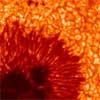
Observations of solar sounds help us to learn about the mechanisms of the sun's magnetic activity, monitor the solar subsurface weather, and predict the formation of sunspots, which affect the Earth's space environment and life.
The Fluid Trampoline
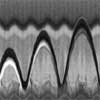
Dip a circular frame into a bottle of soapy water, so that the frame is spanned by a thin soap film. Now, instead of blowing a bubble, turn the frame into the horizontal, and place it on a loud speaker so that it can be vibrated up and down. If the film is stationary, a drop placed on its surface will merge with the film. However, if the film is vibrated, the droplet may bounce up and down as if on a trampoline.
Dynamical Origami
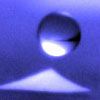
Liquid drops impacting a thin elastic sheet lead to the rapid folding of the sheet into an origami-like structure.
Reducing Drag to Make Ships Go Further with Less Fuel
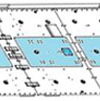
Ships use large quantities of fuel to provide the propulsive power necessary to overcome resistance to their motion across ocean surfaces. Over the years, many techniques have been proposed to reduce this resistance and, therefore, increase a ship’s fuel efficiency.
High-speed Jet Formation after Solid Object Impact
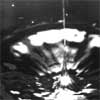
When dropping a stone into water, a thin and very fast water jet can shoot out from the surface -- a familiar and simple everyday phenomenon which any child has tried himself or herself and which is omnipresent in nature and technology. However, only a closer look with high-speed cameras can reveal the rich and complex underlying dynamics.
Self-propulsion of Leidenfrost drops
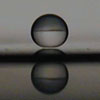
A Leidenfrost drop forms when a liquid is deposited on a surface the temperature of which is large enough to create a film of vapour between the drop and the surface.
Magnetic Soap Bubbles
Researchers have created soap bubbles and films that display the remarkable shapes and colors of ordinary soap films, but are also magnetic, allowing us to manipulate these colors and shapes using an ordinary permanent magnet.
Self-Organized Drops on the Surface of Liquids
Anyone who has ever painted a ceiling and used too much paint or too thin a paint knows the rub: it gathers at certain arbitrary points, becoming thicker and thicker until finally the dye ruptures and drains. Physicists call this behavior an "instability." This paper shows that such an instability can be used to produce a very regular profile of the dye layer.
Rotation and Pulsation of a Blunt Body and Why it Matters for Energy Independence, Reducing Global Warming, and Otherwise Saving the Human Race
The potential benefits of realizing efficient flow-control systems range from saving billions of dollars in annual fuel costs for transportation to achieving economically and environmentally more competitive industrial processes involving fluid flows.
